对未能实现的愿意的表达 英语
在英语学习中如何表达“过去未曾实现的愿望、打算”

在英语学习中如何表达“过去未曾实现的愿望、打算”作者:赵留庚来源:《中国校外教育·高教(下旬)》2014年第14期英语中有多种结构可以用来表示“未曾实现的愿望、意图或打算”,现归纳如下:1.“动词的过去完成时形式+动词不定式的一般式”结构表示“过去未曾实现的愿望”时,只适用于 hope,expect,think,mean,intend,suppose,want,plan等动词作谓语时。
例如:I had hoped to come to help yo u. Something happened to me. That’s why I didn’t come.我本希望能来帮助你,但我出了点事,所以没有来。
I had meant to go away but couldn’t get rid of the children.我本想走开,但是我摆脱不了这群孩子。
2.“hope(expect,think,mean,intend,suppose,want,plan等动词)的过去式 +动词不定式的完成式”结构表示“过去未曾实现的愿望”。
例如:I wanted to have seen you off at the airport but I got there too late.我本来想到机场送你,但是我到那里太迟了。
Tom hoped to have come,but he was too busy at that time.汤姆本想来的,但当时他太忙了,抽不出时间。
3.“动词的过去式+宾语+动词不定式的完成式”结构表示“过去未曾实现的愿望”,这一用法常用于 expect,want,mean,intend等动词作谓语时。
例如:My father expected me to have studied medicine,but I joined the army.我父亲本来指望我学医的,但是我却参军了。
过去未曾实现的愿望表达方式种
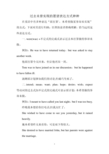
过去未曾实现的愿望表达方式种种在英语中有多种表达“原打算`,本希望做某事却未实现”的方式,下面对其进行归纳,以帮助读者准确理解,恰当运用这些表达方式。
一. were(was) +不定式的完成式表示过去本打算做的事却未做。
例如:He was to have returned today,but was asked to stay another week.他原打算今天回来,但让他再呆一周。
Tom was to have joined us in our discussion,but he happened to have fallen ill.汤姆原计划参加我们的讨论,但碰巧生病了。
二. intend,mean,want,plan,hope,desire,wish,expect 等动词的过去式加不定式的完成式可表示原计划,本希望做的事却未做。
例如:I meant to have called you last night,but I was too busy.昨晚我本想给你打电话,但我太忙了。
She wished to have come to see you yesterday, but it rained heavily.她本希望昨天来看你,可是雨下得很大。
She desired to have married John, but her parents were against the marriage.她非常想嫁给约翰,可是父母反对这桩婚事。
有的语法书上提到上面这些动词的过去式加上不定式的一般式也可表示过去未曾实现的愿望,打算或意图。
例如:I intended to write her a letter yesterday, but I forgot to.昨天我本想给她写封信,但后来忘了。
三. intend,mean,want,plan,hope,desire,wish,expect 等动词的过去完成式后加不定式的一般式也可表达此意。
名校版高考英语经典句型考点解析 would rather

名校版高考英语经典句型考点解析would ratherJohn wants to see me today. I would rather he came to tomorrow than today.约翰今天想来看我。
我宁愿他明天来看我而不是今天。
would rather经典句型全解析一、would rather意思是“宁愿、宁可、更、最好、还是为好”,后接动词原形,常省略为’d rather,表示优先选择的一种方式其否定形式是would rather not do sth。
would rather;没有人称和数的变化,所有的人称一律用would rather。
“would rather+动词原形”是英语中常见的一个惯用句式,美国英语中多用had rather。
would (had)在此决无“过去”之意,它是一个情态助动词,且无词性、时态变化。
例:I'd rather meet him here on my own home ground.我宁愿在我自己的地盘上见他。
I'd rather come with you.我倒愿意和你一起去。
I'd rather not talk about it in mixed company.在男女混杂的场合,我不愿意谈论这件事。
Sorry. I'd rather not talk about it抱歉,我不愿意谈论这个。
I'd rather not dwell on the past.我不想再沉湎于过去了。
I'd rather not talk about it too much because I don't like giving trade secrets away.我不愿就此多谈,因为我不想泄露秘密。
If you’d rather be alone, we’ll all leave here.如果你宁愿独自呆着,那我们都离开这儿。
高中英语单词天天记willing素材

· willing· adj. ['wŋnlŋŋ] ·· 双解释义· P 愿意的,心甘情愿的 regarding favourably the possibility of doing sth; ready· 乐意的,自愿的 acting eagerly and without being forced· A 主动的,乐意的 done or given gladly and without being forced· 基本要点∙1.willing的意思是“愿意的,心甘情愿的”“乐意的,自愿的”“主动的”。
2.willing作“愿意的,心甘情愿的”解时在句中只用作表语; 作“主动的,乐意的”解时在句中只用作定语; 作“乐意的,自愿的”解时在句中用作定语,也可用作表语。
3.willing作表语时后常接动词不定式或that从句,表示“愿意〔乐意〕干某事”,that从句的谓语动词须用虚拟语气。
∙· 词汇搭配∙~+名词∙willing aid 志愿的援助∙willing faculty 决断能力∙willing gift 自愿赠送的礼物∙willing helper 热心的帮助者∙willing horse 自愿工作的人,干活主动的人∙willing mind 有心人∙willing obedience 百依百顺∙willing sacrifice 自愿作出的牺牲∙willing worker 积极肯干的工人∙~+动词不定式∙willing to accept responsibility 愿意承担责任∙willing to follow one's example 乐意向…学习∙willing to help 乐意帮助∙willing to marry 愿意结婚∙willing to pay 愿意付∙willing to wait 愿意等候· 句型例句∙用作定语▲~+n.She is a willing helper.她是一位热心的帮助者。
谈谈未曾实现的愿望的十种表达法

谈谈“未曾实现的愿望”的十种英语表达法近几年的高考中,考查了一些未曾实现的愿望的表达法,本文就中学常见的十种未曾实现的愿望的句型作一归纳,以飨读者。
一.情态动词. should , ought to ,would. could , might 等后接不定式的完成式表示过去本来打算做、想做或应该做而未做的事。
1.I was really anxious about you. you shouldn't have left without a word. (NMET 2001)我真的很为你担心,你本不该一声不哼就离开2.You ought to have kept your promise. Why did you change your mind? 你本应该坚守你的诺言,为什么你又改变了你的主意的?3.I would have told you the truth but I wasn't allowed to do so. 我本想告诉你真相,但是情况不充许4.—I stayed at a hotel while in New York. —在纽约的时候我住在一家旅馆里。
—Oh, did you? You could have stayed with Barbara.—噢,是吗?你本可以和Barbara住在一起。
(NMET 98)5.I might have given you some help, but I went to Beijing on business at that time.我本来可以帮帮你的忙,但是那时我出差去北京了。
注意:should have done 还可以表示对已发生的事情的惊讶、不快、喜悦、遗憾等感情色彩,译为“竟然”,could/might have done 还可以表示对过去发生的事的推测,译为“可能做过某事”。
1.It's surprising that her novel should have won the first prize. 她的小说居然获得了头等奖,真奇怪。
would rather语法

“would rather do sth.”是英语中常见的一个固定惯用句式(美国英语中多用had rather)。
would(或had)rather的缩写形式为’d rather。
would (had) rather中的would并无过去的意思。
该句式常用来表示选择的意愿,意谓“宁可……”、“宁愿……”、“最好……”。
例如:He’d rather work in the countryside. 她宁可到农村去工作。
If you’d rather be alone, we’ll all leave here. 如果你宁愿独自呆着,那我们都离开这儿。
You would rather stay at home and do some reading this evening. 今晚你最好呆在家中读点书。
would rather与than连用,可构成另一个惯用句式,即:“would rather...than....”,意谓“宁可(愿)……(而)不要(愿)……”、“与其……不如……”。
用以表达主语的意愿,强调经过选择后做其中一件事,而不愿做另一件事。
例如:I would rather watch TV at home than go to the cinema. 我宁可在家看电视而不愿去看电影。
The children would rather walk there than take a bus. 孩子们宁愿步行去那里而不乘公共汽车。
在使用“would rather...than...”句型时,应注意以下几点:1. than 后边也应接动词原形,但如该句型前后连接的两个动词相同,则than之后的那个动词可省去。
例如:I’d rather you know that now than afterwards. 我宁可你现在就知道这件事,而不是以后。
2. would rather...than...也可改写“would...rather than...”,其用法及含义仍不变。
与意愿有关的英语词汇
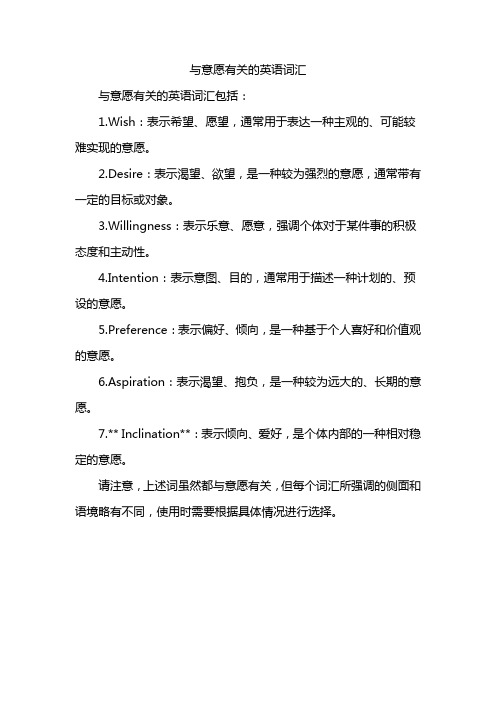
与意愿有关的英语词汇
与意愿有关的英语词汇包括:
1.Wish:表示希望、愿望,通常用于表达一种主观的、可能较难实现的意愿。
2.Desire:表示渴望、欲望,是一种较为强烈的意愿,通常带有一定的目标或对象。
3.Willingness:表示乐意、愿意,强调个体对于某件事的积极态度和主动性。
4.Intention:表示意图、目的,通常用于描述一种计划的、预设的意愿。
5.Preference:表示偏好、倾向,是一种基于个人喜好和价值观的意愿。
6.Aspiration:表示渴望、抱负,是一种较为远大的、长期的意愿。
7.** Inclination**:表示倾向、爱好,是个体内部的一种相对稳定的意愿。
请注意,上述词虽然都与意愿有关,但每个词汇所强调的侧面和语境略有不同,使用时需要根据具体情况进行选择。
意愿的英语表达
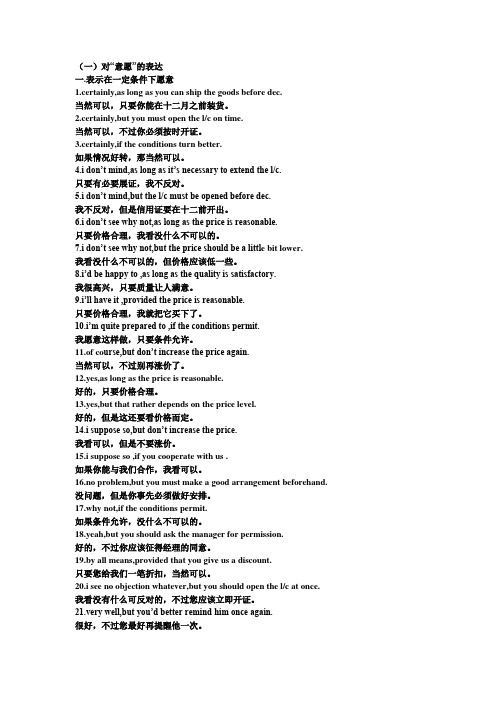
(一)对“意愿”的表达一.表示在一定条件下愿意1.certainly,as long as you can ship the goods before dec.当然可以,只要你能在十二月之前装货。
2.certainly,but you must open the l/c on time.当然可以,不过你必须按时开证。
3.certainly,if the conditions turn better.如果情况好转,那当然可以。
4.i don’t mind,as long as it’s necessary to extend the l/c.只要有必要展证,我不反对。
5.i don’t mind,but the l/c must be opened before dec.我不反对,但是信用证要在十二前开出。
6.i don’t see why not,as long as the price is reasonable.只要价格合理,我看没什么不可以的。
7.i don’t see why not,but the price should be a littl e bit lower.我看没什么不可以的,但价格应该低一些。
8.i’d be happy to ,as long as the quality is satisfactory.我很高兴,只要质量让人满意。
9.i’ll have it ,provided the price is reasonable.只要价格合理,我就把它买下了。
10.i’m quite prepared to ,if the conditions permit.我愿意这样做,只要条件允许。
11.of co urse,but don’t increase the price again.当然可以,不过别再涨价了。
12.yes,as long as the price is reasonable.好的,只要价格合理。
英语对“意愿”的表达

(一)对“意愿”的表达一.表示在一定条件下愿意1.certainly,as long as you can ship the goods before dec.当然可以,只要你能在十二月之前装货。
2.certainly,but you must open the l/c on time.当然可以,不过你必须按时开证。
3.certainly,if the conditions turn better.如果情况好转,那当然可以。
4.i don't mind,as long as it's necessary to extend the l/c.只要有必要展证,我不反对。
5.i don't mind,but the l/c must be opened before dec.我不反对,但是信用证要在十二前开出。
6.i don't see why not,as long as the price is reasonable.只要价格合理,我看没什么不可以的。
7.i don't see why not,but the price should be a little bit lower. 我看没什么不可以的,但价格应该低一些。
8.i'd be happy to ,as long as the quality is satisfactory.我很高兴,只要质量让人满意。
9.i'll have it ,provided the price is reasonable.只要价格合理,我就把它买下了。
10.i'm quite prepared to ,if the conditions permit.我愿意这样做,只要条件允许。
11.of course,but don't increase the price again.当然可以,不过别再涨价了。
高考英语必备句之用于表示过去未实现的希望和计划的句型
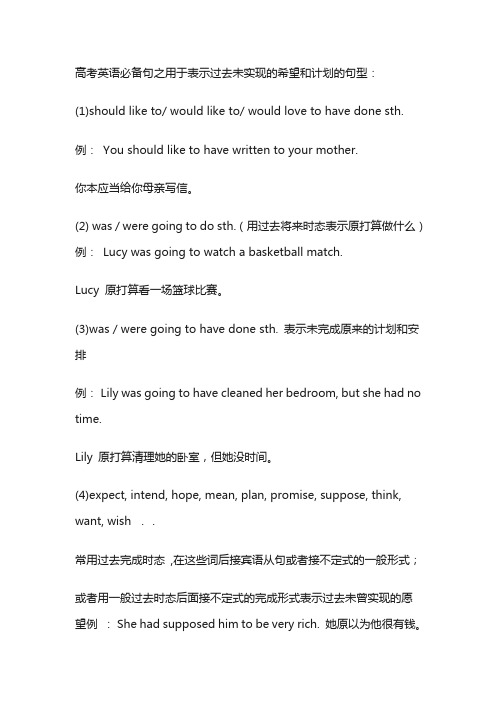
高考英语必备句之用于表示过去未实现的希望和计划的句型:(1)should like to/ would like to/ would love to have done sth.例:You should like to have written to your mother.你本应当给你母亲写信。
(2) was / were going to do sth.(用过去将来时态表示原打算做什么)例:Lucy was going to watch a basketball match.Lucy 原打算看一场篮球比赛。
(3)was / were going to have done sth. 表示未完成原来的计划和安排例:Lily was going to have cleaned her bedroom, but she had no time.Lily 原打算清理她的卧室,但她没时间。
(4)expect, intend, hope, mean, plan, promise, suppose, think, want, wish ..常用过去完成时态,在这些词后接宾语从句或者接不定式的一般形式;或者用一般过去时态后面接不定式的完成形式表示过去未曾实现的愿望例:She had supposed him to be very rich. 她原以为他很有钱。
(5)wish that had done sth.表示过去未曾实现的愿望.例:I wish he had been here yesterday. 要是他昨天在这儿就好了。
(6)情态动词should ,would, could, might, ought to 等后接不定式的完成时,表示过去本该做,打算做,想做而未做的事情.should have done =ought to have done 本应该做而没做would have done = 本来就会去做某事而没做could have done = 本可以做某事而没做might have done 本可以做而没做例:They ought to have apologized. 他们本该道歉的。
初中英语知识点归纳情态动词的意愿和可能性
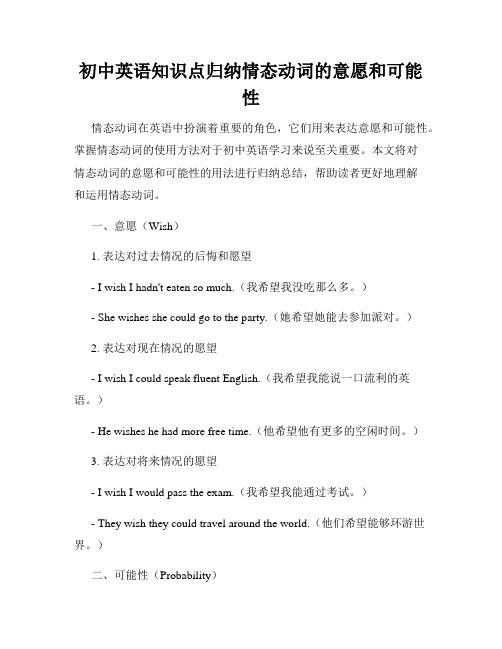
初中英语知识点归纳情态动词的意愿和可能性情态动词在英语中扮演着重要的角色,它们用来表达意愿和可能性。
掌握情态动词的使用方法对于初中英语学习来说至关重要。
本文将对情态动词的意愿和可能性的用法进行归纳总结,帮助读者更好地理解和运用情态动词。
一、意愿(Wish)1. 表达对过去情况的后悔和愿望- I wish I hadn't eaten so much.(我希望我没吃那么多。
)- She wishes she could go to the party.(她希望她能去参加派对。
)2. 表达对现在情况的愿望- I wish I could speak fluent English.(我希望我能说一口流利的英语。
)- He wishes he had more free time.(他希望他有更多的空闲时间。
)3. 表达对将来情况的愿望- I wish I would pass the exam.(我希望我能通过考试。
)- They wish they could travel around the world.(他们希望能够环游世界。
)二、可能性(Probability)1. 表达对现在情况的可能性- He may be busy right now.(他现在可能很忙。
)- She might know the answer.(她可能知道答案。
)2. 表达对过去情况的推测- They must have arrived at the destination by now.(他们现在应该已经到达目的地了。
)- He could have forgotten his keys.(他可能忘记带钥匙了。
)3. 表达对将来情况的推测- It will probably rain tomorrow.(明天可能会下雨。
)- They might come to the party.(他们可能会来参加派对。
)三、其他用法1. 表示请求或建议- Can you please help me with my homework?(你能帮我做作业吗?)- Should we go to the movies tonight?(我们今晚去看电影好吗?)2. 表示允许或禁止- You may use my computer if you need to.(如果需要,你可以用我的电脑。
willingness用法 -回复
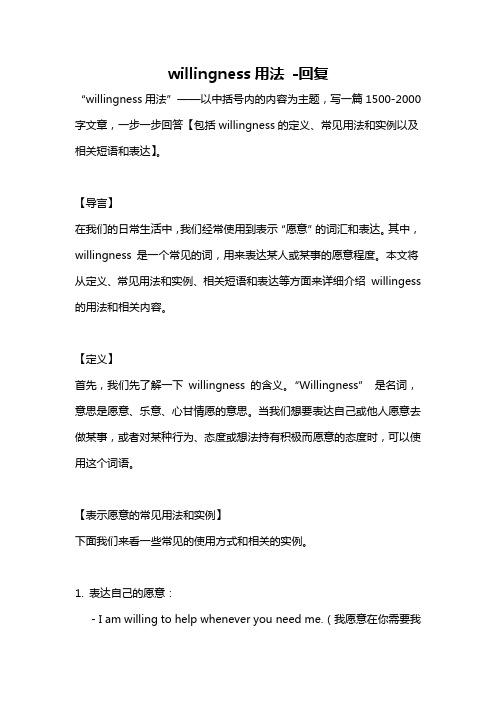
willingness用法-回复“willingness用法”——以中括号内的内容为主题,写一篇1500-2000字文章,一步一步回答【包括willingness的定义、常见用法和实例以及相关短语和表达】。
【导言】在我们的日常生活中,我们经常使用到表示“愿意”的词汇和表达。
其中,willingness 是一个常见的词,用来表达某人或某事的愿意程度。
本文将从定义、常见用法和实例、相关短语和表达等方面来详细介绍willingess 的用法和相关内容。
【定义】首先,我们先了解一下willingness 的含义。
“Willingness”是名词,意思是愿意、乐意、心甘情愿的意思。
当我们想要表达自己或他人愿意去做某事,或者对某种行为、态度或想法持有积极而愿意的态度时,可以使用这个词语。
【表示愿意的常见用法和实例】下面我们来看一些常见的使用方式和相关的实例。
1. 表达自己的愿意:- I am willing to help whenever you need me.(我愿意在你需要我的时候帮助你。
)- She is always willing to listen and give advice when I have problems.(当我有问题时,她总是乐于倾听并提供建议。
)2. 表达别人的愿意:- Tom is always willing to lend a hand to anyone who needs it.(对于任何需要帮助的人,Tom总是乐于伸出援手。
)- Our team members are willing to work overtime to meet the deadline.(我们团队的成员愿意加班工作以满足截止日期。
)3. 表达愿意做某事:- Are you willing to take on this responsibility?(你愿意承担这个责任吗?)- Despite the risks, she is still willing to pursue her dreams.(尽管有风险,她仍然愿意追求自己的梦想。
be willingto的知识点

任务名称:be willing to1. 简介“Be willing to”是一个英语短语,意思是愿意或乐意去做某件事情。
这个短语常用于表达一个人的态度、意愿或心情。
它可以用来描述一个人的积极态度和乐于助人的心态。
2. 用法“Be willing to”结构为:be + willing + to + 动词原形。
它可以用于各种句子结构,包括肯定句、否定句和疑问句。
2.1 肯定句•I am willing to help you with your homework.•She is willing to try new things.•They are willing to work overtime.2.2 否定句•He is not willing to apologize for his mistake.•We are not willing to compromise on this issue.•The company is not willing to negotiate a higher salary.2.3 疑问句•Are you willing to take on more responsibility?•Is she willing to go on a blind date?•Are they willing to contribute money for charity?3. 意义和表达“Be willing to”的使用可以表达一个人的态度和意愿。
它强调了一个人主动参与、积极行动以及对他人的帮助和支持。
这个短语常用于以下情况: - 表示对某件事情或活动的积极态度。
例如,我愿意帮助你完成作业,她愿意尝试新事物。
- 表示对某种改变或挑战的接受和乐于参与。
例如,他不愿意为自己的错误道歉,我们不愿意在这个问题上妥协。
- 表示对某种行为或决定的支持和赞同。
例如,公司不愿意谈判更高的薪水。
高中英语知识点归纳情态动词的愿望和请求
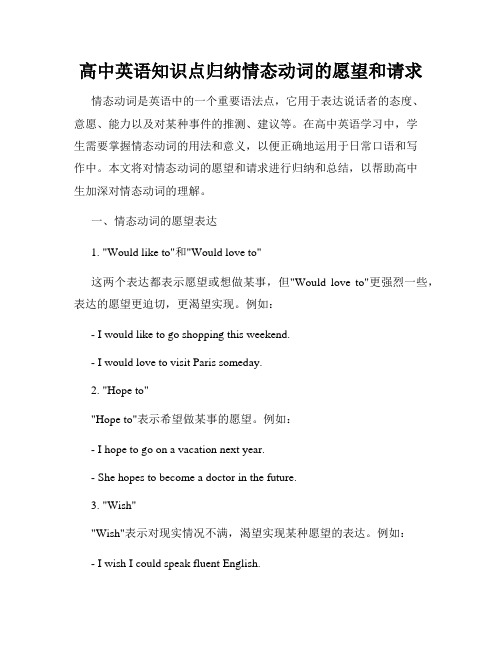
高中英语知识点归纳情态动词的愿望和请求情态动词是英语中的一个重要语法点,它用于表达说话者的态度、意愿、能力以及对某种事件的推测、建议等。
在高中英语学习中,学生需要掌握情态动词的用法和意义,以便正确地运用于日常口语和写作中。
本文将对情态动词的愿望和请求进行归纳和总结,以帮助高中生加深对情态动词的理解。
一、情态动词的愿望表达1. "Would like to"和"Would love to"这两个表达都表示愿望或想做某事,但"Would love to"更强烈一些,表达的愿望更迫切,更渴望实现。
例如:- I would like to go shopping this weekend.- I would love to visit Paris someday.2. "Hope to""Hope to"表示希望做某事的愿望。
例如:- I hope to go on a vacation next year.- She hopes to become a doctor in the future.3. "Wish""Wish"表示对现实情况不满,渴望实现某种愿望的表达。
例如:- I wish I could speak fluent English.- She wishes she didn't have to work overtime.二、情态动词的请求表达1. "Can/Could you...?"这是一种常见的请求表达方式,用于向他人提出请求、询问或询求帮助。
例如:- Can you lend me your pen?- Could you please pass me the salt?2. "Would you mind...?"这是一种更加礼貌的请求表达方式,用于向他人提出请求或询问并强调尊重对方意愿。
wish常常表示比较难以实现的愿望

Unit 16 The seaLesson 61Step 1 free talk1.Show the students a map of the world. Ask them to tell the names of as many oceans and seas of the world as they know.Step 2 preparations for dialogueLook at the picture. Ask the students some questions about the picture, and get the students to tell what they think is happening.Step 3 dialogue1.Ask the students to read the dialogue and answer the questions:Where would Bruce like to go today?What do Bruce and Li Qun talk about?2.Play the tape for the students to listen and follow.3.Go through the dialogue briefly and make sure the students understand it.Step 4 Practice1.Go through the instructions for the pair work and check that the students understand the situation and what they have to do. Do a demonstration with a good student to show how to use the prompts. Take the role of B and start like this:T: hello, … What’s the matter? You don’t look very happy.S: No, I’m not very happy.T: Why aren't you happy?2.Do this demonstration dialogue two or three times with different students so that they get the idea of how the dialogue can develop. Take the role of B in one of these dialogues. Then put the students in pairs and get them to have a dialogue, changing roles when they have finished.Step 5 consolidationDiscuss with partner, the suggested topic:Why do people like to spend holidays near the sea?Step 6 homeworkFinish off all the Workbook exercises on page 88.Read aloud the dialogue.Lesson 62Step 1 Revision1.Ask the students to read and act out the dialogue.Step 2 introduction of some seas:the Mediterraneanthe dead seathe Great Barrier ReefStep 2 preparations for reading1.Pre-reading discussion. Ask the students to discuss the questions., not reading the text book.Step 3 ReadingGo through Ex. 1 and make sure the students know what to do. Let them read the whole passage carefully and choose the best answer to each question, working in pairs or small groups. Check the answers with whole class. Step 4 Reading aloudPlay the tape of the passage for the students to listen and follow. Play the tape of part of the passage again; this time the students listen and repeat. Pay attention to sentence stress in the longer sentence.Step5 Note makingPart 4. Check that the students know what they have to do. The purpose of this activity is to ensure that every S makes an effort to re-read the texts and extract the relevant information. Get the students to complete this task individually, either in class or for homework. Answers can be checked at the beginning of the next lesson. Step 6 homeworkRead the passage in Lesson 62 again, and try to recite it.Finish off all Workbook exercises and the not-making exercise in Part 4 of the students’ Book.Lesson 63.Step 1 Revision1. Check the homework exercises.2.Ask the students to retell the text according to the following questions:1)Which is the saltiest lake in the world?2)Which is saltier--- the Atlantic or the Mediterranean?3)Where can you find coral?4)What plants keep sea water clean?5)Why don’t you find coral near the mouths of rivers?6)Where is the longest coral bed in the world?7)Why is the Dead Sea called the Dead Sea?Step 2 presentationIntroduction to some interesting sea life:whaleStep 2 Preparation for reading1. Get the students to look at the picture and tell what they can see.2.Ask the students to read the passage quickly and find out the answers to the question: which living things in the oceans are mentioned in the text?Step 3 Reading1. Let students to read the passage again and discuss the questions of Part2. Go through the answers with the students.Answers:1)Their blood contains a particular chemical to help them live in below-zero sea temperatures.2)The sperm whale has teeth.3)Small fish.4)Squid.5)It can dive to 1000 meters.6)Its heart slows to half its normal speed, and the oil its head is probably cooled at the same time.7)By using sound waves in the dark.1.Do Ex. 1.Step 4 Practice1. Read aloud the instruction. Do the first three items with the whole class. Then let the students work in pairs, writing in the words which have been left out. Go through the answers at the end.1)I beg your pardon. I haven’t seen you for ages.2)I’m sorry to h ear that. Come this way, please.3)Have you found the treasure? Would you like some more tea?4)It doesn’t matter.It was a pity that you couldn’t come/5)That sounds fine to me. What terrible weather it is?6)Have you ever been to the seaside? No, we ca n’t afford to go the seaside.7)Don’t tell me the name of the sailor if you don’t want to tell me the name of the sailor.8)I don’t think they have returned from the beach.Step 5 HomeworkWrite a composition about sea. Creative ideas are encouraged.Lesson 64Step one dictation of expressions of this unit1.hold one’s breath2.take a deep breath3.make a decision4.go swimming go for a bathe5.time sb time a racee up look up one’s head7.water turns into a solid when it is freezing8.variety of seaweeds9. a variety of animal life10.dive to a depth of 1000 meters11.construction work12.it’s partly my fault13.on the average14.float on the surface of the sea15.the Dead Sea is below the sea level16.at a time17.the North Pole 18.beg one’s pardon19.in the opposite directiony eggs21.do the opposite22.go on a voyage23.grow to a length of 4mm/grow to 4mm in length24.can’t afford to do sth25.feed on26.at the bottom of the ocean27. a particular chemical28.numbers of29.notice sb doing/do30.manage to do sth31.slow to half of the normal speed32.the saltiest lake in the Middle East33.cross the river34.350 parts of salt per thousand parts of waterstep 2 listening practiceplay the tape for the first time to grasp the main idea.And then play the tape for the second time to finish off the detailed exercises.Check the answers with the whole class.Step 3 language points of this unit1. I wish I could go to the seaside today.wish常常表示比较难以实现的愿望,或与事实相反的情景,因此它所接的从句中总是采用过去式虚拟语气。
对未能实现的愿意的表达英语

一、should like to/would like to/would love to+不定式完成式,表示主语过去希望做但未做到的事。
例如:二、1.I should like to have climbed the mountain with her.当时我真想和她一起爬那座山。
三、2.We would like to have gone to see the film,but we had no time.我们本来想去看那部电影,但没有时间。
四、3.I would love to have gone to the cinema to see the film that day,but the tickets were allsold out.那天我本想去电影院看那部电影,但门票都售完了。
五、二、was/were doing sth.表示主语过去未曾实现的安排或打算。
例如:六、1.Oh dear!I was writing him a letter this morning,but I forgot all about it.哦天哪!我今天上午本打算给他写信的,但我把这事给全忘了。
七、2.We were planning to spend part of the winter vacation together,but now I don’t think Iwant to invite him home.(SEFC BOOK1A,P54)我们本来计划一起度过部分寒假的,但现在我认为不想请他来我家了。
八、三、was/were going to+不定式一般式,表示一种主语过去未曾实现的打算或计划,意为“本打算……”“本想……”例如:九、1.——Where did you go for your weekend?你去了哪里过周末?十、——Well,I was going to visit Beijing,but in the end I went to Shanghai.哦,我本打算去北京的,但最后去了上海。
高中英语语法如何表达未曾实现的意图
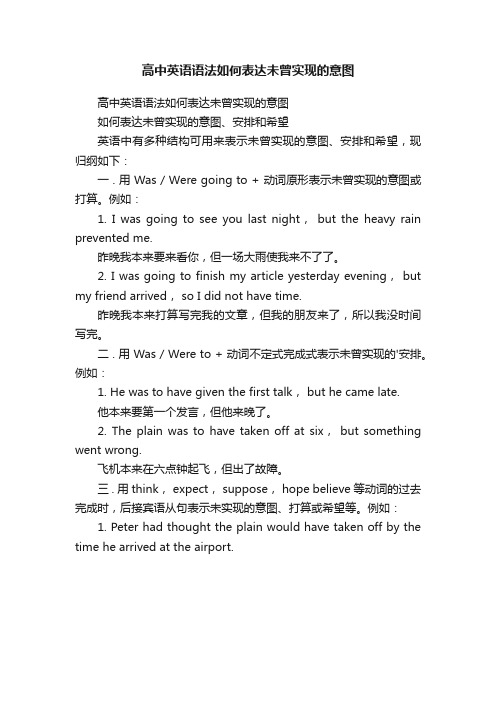
高中英语语法如何表达未曾实现的意图高中英语语法如何表达未曾实现的意图如何表达未曾实现的意图、安排和希望英语中有多种结构可用来表示未曾实现的意图、安排和希望,现归纲如下:一 . 用 Was / Were going to + 动词原形表示未曾实现的意图或打算。
例如:1. I was going to see you last night,but the heavy rain prevented me.昨晚我本来要来看你,但一场大雨使我来不了了。
2. I was going to finish my article yesterday evening, but my friend arrived, so I did not have time.昨晚我本来打算写完我的文章,但我的朋友来了,所以我没时间写完。
二 . 用 Was / Were to + 动词不定式完成式表示未曾实现的'安排。
例如:1. He was to have given the first talk, but he came late.他本来要第一个发言,但他来晚了。
2. The plain was to have taken off at six,but something went wrong.飞机本来在六点钟起飞,但出了故障。
三 . 用 think, expect, suppose, hope believe 等动词的过去完成时,后接宾语从句表示未实现的意图、打算或希望等。
例如:1. Peter had thought the plain would have taken off by the time he arrived at the airport.。
“未曾实现的愿望、打算”表达法种种

“未曾实现的愿望、打算”表达法种种杨开成;张秀清【期刊名称】《中学英语园地:高三版》【年(卷),期】2005(000)010【摘要】英语中有多种结构可以用来表示“未曾实现的愿望、意图或打算”,现归纳如下:1.“动词的过去完成时形式+动词不定式的一般式”结构表示“过去未曾实现的愿望”时,只适用于hope,expect,think,m ean,in-tend,suppose,want,plan 等动词作谓语时。
例如:I had hoped to com e to help you.Som ething happened to m e.Thatswhy I didn t com e.我本希望能来帮助你,但我出了点事,所以没有来。
I had m eant to go away but couldn t get rid ofthe children.我本想走开,但是我摆脱不了这群孩子。
2.“动词的过去式+动词不定式的完成式”结构表示“过去未曾实现的愿望”,这种用法也只适用于上面列举的动词作谓语时。
例如:I w anted to have seen you off at the airport but I got there too late.我本来想到机场送你,但是我到那里太迟了。
Tom hoped to have com e,but he w as...【总页数】5页(P)【作者】杨开成;张秀清【作者单位】【正文语种】中文【中图分类】G63【相关文献】1.在英语学习中如何表达“过去未曾实现的愿望、打算” [J], 赵留庚;2."也"的种种表达法 [J], 罗贤龙3.英语中对未曾实现的愿望及打算的表达 [J], 李新年4.“花费”表达法种种 [J], 邵正霞;杨利明;5.如何表达“过去未曾实现的愿望或计划” [J], 罗成勇;因版权原因,仅展示原文概要,查看原文内容请购买。
wish后加动词什么形式

wish后加动词什么形式
动词不定式即to do,表示希望某人做某事。
wish常用于虚拟语气中,表示某种不能实现的愿望。
其主要形式有三种:表示对现在情况的虚拟、表示对将来情况的虚拟、表示对过去情况的虚拟。
虚拟语气通常用于wish后的宾语从句中,表示与事实相反或不大可能实现的愿望。
通常有三种形式:
1、对将来发生的事情表示祝愿或愿望:主语+wish+从句主语+would(could,might)+动词原形,如:
I wish she would try again.
我希望她能再试一次。
2、表示与现在事实相反的愿望:主语+wish(that)+从句主语+动词过去式。
如:
I wish I wasn' leaving my son.
我希望我没离开我儿子。
3、对过去发生的事情表示遗憾或后悔时:主语+wish(that)+从句主语+would/could have/had+过去分词。
如:
I wish you had come to my birthday party.
你要是来了我的生日晚会就好了。
be unsuccessful in sth的词
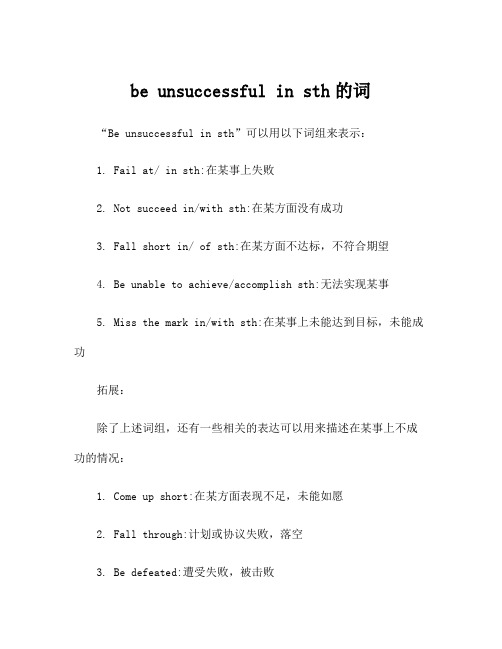
be unsuccessful in sth的词“Be unsuccessful in sth”可以用以下词组来表示:
1. Fail at/ in sth:在某事上失败
2. Not succeed in/with sth:在某方面没有成功
3. Fall short in/ of sth:在某方面不达标,不符合期望
4. Be unable to achieve/accomplish sth:无法实现某事
5. Miss the mark in/with sth:在某事上未能达到目标,未能成功
拓展:
除了上述词组,还有一些相关的表达可以用来描述在某事上不成功的情况:
1. Come up short:在某方面表现不足,未能如愿
2. Fall through:计划或协议失败,落空
3. Be defeated:遭受失败,被击败
4. Be disappointed in/outcome:对结果感到失望
5. Meet with no success:在某物上未获成功
6. Be a letdown:对某事感到失望,不满意
请注意,“be unsuccessful in sth”只是其中一种表达方式,具体使用哪个词组要根据具体语境和想要表达的意思来决定。
- 1、下载文档前请自行甄别文档内容的完整性,平台不提供额外的编辑、内容补充、找答案等附加服务。
- 2、"仅部分预览"的文档,不可在线预览部分如存在完整性等问题,可反馈申请退款(可完整预览的文档不适用该条件!)。
- 3、如文档侵犯您的权益,请联系客服反馈,我们会尽快为您处理(人工客服工作时间:9:00-18:30)。
一、should like to/would like to/would love to+不定式完成式,表示主语过去希望做但未做到的事。
例如:1.I should like to have climbed the mountain with her.当时我真想和她一起爬那座山。
2.We would like to have gone to see the film,but we had no time.我们本来想去看那部电影,但没有时间。
3.I would love to have gone to the cinema to see the film that day,but the tickets were all sold out.那天我本想去电影院看那部电影,但门票都售完了。
二、was/were doing sth.表示主语过去未曾实现的安排或打算。
例如:1.Oh dear!I was writing him a letter this morning,but I forgot all about it.哦天哪!我今天上午本打算给他写信的,但我把这事给全忘了。
2.We were planning to spend part of the winter vacation together,but now I don’t think I want to invite him home.(SEFC BOOK1A,P54)我们本来计划一起度过部分寒假的,但现在我认为不想请他来我家了。
三、was/were going to+不定式一般式,表示一种主语过去未曾实现的打算或计划,意为“本打算……”“本想……”例如:1.——Where did you go for your weekend?你去了哪里过周末?——Well,I was going to visit Beijing,but in the end I went to Shanghai.哦,我本打算去北京的,但最后去了上海。
2.——I was going to play volleyball on Monday,but I can’t now.我本想星期一打排球的,但现在不可能了。
——Bad luck.(SEFC BooklA,P56)真不走运。
——What did you do last Sunday?上星期天你做了什么?——Well,I was going to a cinema,but in the end I went to see a fashion show.哦,我本来打算去看电影的,但最后去看时装表演了。
——Really?Why didn’t you call me?真的?你为什么不叫我?——I was going to call for you,but my sister took the other ticket.(SEFC BooklA,P124)我本想叫你的,但我妹妹把另一张票拿走了。
4.Dr Lively was going to give a talk this morning.I’m afraid her plane will be very late because of bad weather at the airport.(SEFC BooklB,P42)莱夫利博士本打算今天上午作报告的。
由于机场的天气不好,恐怕她的班机会晚点。
四、was/were to+不定式完成式,表示未完成的打算、计划或安排,含有“本来打算……”之意。
如:1.He was to have bought a colour TV set,but he had no enough money.他本来打算买一台彩色电视机的,但钱不够。
2.They were to have been married last month but had to postpone the wedding until next month,他们本来打算在上个月结婚的,但后来不得不推迟到下个月。
3.He was to have come here yesterday,but he had an important meeting to attend.他本来打算昨天来这里的,但有一个重要的会议要参加。
4.The plane was to have taken off at six,but something went wrong.飞机本来打算在六点钟起飞,但结果出了故障。
5.We were to have held the sports meeting last week,but it rained.我们本来打算上周举行运动会的,但天下雨了。
6.I was to have started work last week,but I caught a bad cold.我本来打算上星期开始工作的,可我患了感冒。
7.A new hospital was to have been built in this district,but the money wasn’t collected yet.一座新医院本来打算在这个区建成的,可款还没有筹齐。
五、was/were about to+ 不定式一般式,表示主语过去未曾实现的意图。
例如:1.Mrs Green was about to begin,but Jennie spoke first.格林太太正要开始讲,可詹妮开口了。
2.This afternoon I was just about to go swimming when luckily our guide saw me and shouted at me,“Stop!Don’t swim”(SEFC BooK1A,P14)今天下午我正要去游泳,就在那时幸好我们的向导看见了我并对我喊道:“站住!不能游泳!”六、英语中表示愿望的动词如expect,intend,hope,mean,plan,promise,suppose,think,want,wish等用于过去完成式后接不定式一般式或宾语从句,表示未曾实现的愿望或打算。
例如:1.I had intended to come over to see you last night,but someone called and I couldn’t get away.昨晚我本来打算过来看你的,可有人来找我,我走不了。
2.They had wanted to help but could not get here in time.他们本来想帮忙的可没能及时赶到。
3.I had thought Tom would pass the exam this time,but he failed again.我本以为汤姆这次会通过考试的,可他又没及格。
4.We had thought of giving Mery a surprise,but she knew the secret early.我们本想给玛莉一个惊喜的,可她早知道了那秘密。
5.I had hoped to be able to take my seat in all this noise without being seen,but that morning the room was quite and orderly.我本指望在吵闹声中坐到自己的座位上而不被人看见,可那天早上教室里安静又整齐。
6.We had planned to go the station and take the train to Guangzhou on saturday morning,but you didn’t turn up.星期六上午我们原计划去火车站乘车去广州的,可你没有来。
七、英语中表示愿望的动词如expect,intend,hope,mean,plan,promise,suppose,think,want,wish等的过去时后接不定式完成式,表示过去未曾实现的愿望。
例如:l.He intended to have written the manager a letter this morning,but he was very busy.他本打算今天上午给经理写信的,可太忙了。
2.I meant to have given you the dictionary yesterday,but I forgot to bring it here.我本打算昨天给你字典的,可我忘记把它带来了。
3.I wanted to have seen you very much,but I did not like to trouble you.我本来很想去看你,可我又不想打扰你。
4.He promised to have lent her some money,but he didn’t.他本答应借给她一些钱,可他没有借。
5.I hoped to have finished the work earlier.我本希望早点做完这项工作。
八、wish+that-从句(从句中谓词动词用had+过去分词),表示过去未曾实现的愿望。
例如;1.I wish I had finished the work in time。
我希望我及时做完了那工作。
(但实际没有)2.I wish I had written a letter to you.我希望我给你写了封信。
(但事实上没有)九、情态动词如should,would,could,might,ought,to等后接不定式完成式,表示过去本来打算做、想做或应该做而未做的事。
例如:1.He might have given you more help,even though he was very busy.(MET’90)他本可能多给你些帮助,即使他当时很忙。
2.——We could have walked to the station;it was so near.我们本可以步行去火车站;火车站那么近。
——Yes.A taxi wasn’t at all necessary.(NMET92-16)是的。
搭的士根本没必要。
3、——I stayed at a hotel while in New York.在纽约时我呆在一家旅馆里。
——oh,did you?You could have stayed with Barbara.(NMET98-19)哦,是吗?你本可以和芭白拉呆在一起的。
4.He could have gone by bus then,but he went on foot.当时他本可以坐汽车去,但他却步行去了。
